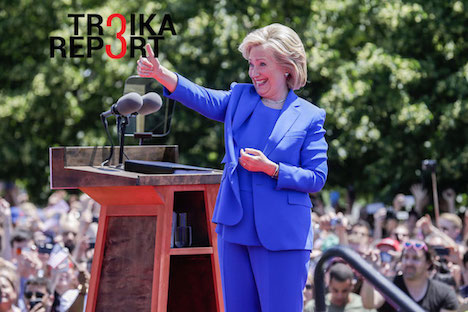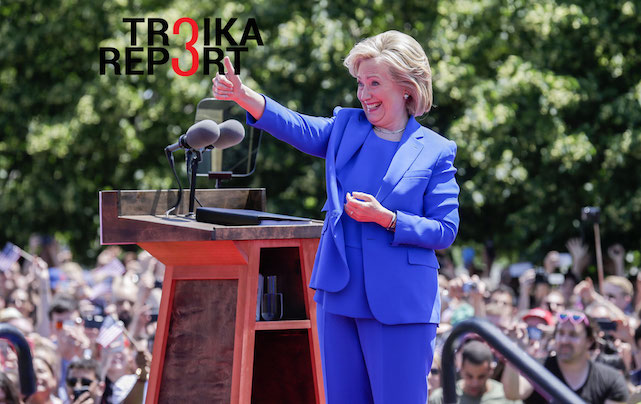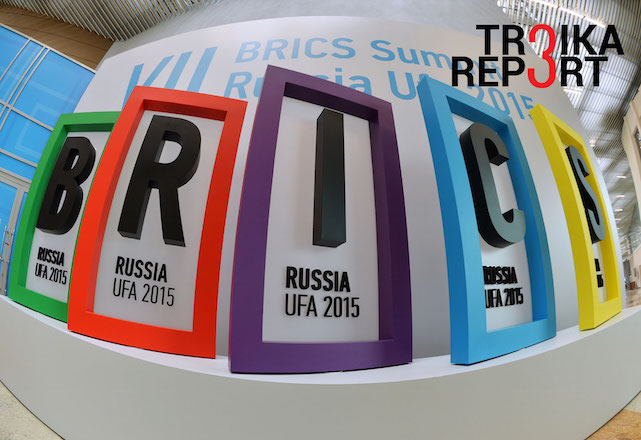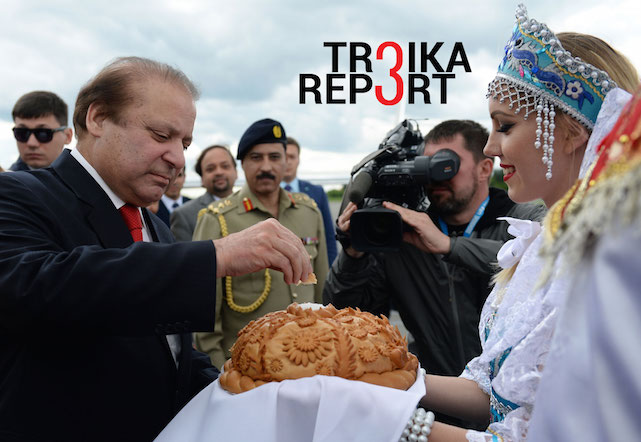

If Hillary Clinton is elected U.S. president in 2016, could we really witness a major shift in U.S. foreign policy towards Russia? Source: EPA/ANDREW GOMBERT
Hillary Clinton, frontrunner for the U.S. Democratic presidential nomination, has made waves in media this week by saying engagement is the best option when it comes to confronting Russian President Vladimir Putin. The promising overture coincided with the Russian leader’s conciliatory message to his U.S. counterpart Barack Obama to mark U.S. Independence Day on July 4, in which Putin called for dialogue built on “equality and respect.” Could this be taken as a faint signal that both sides would be prepared to consider a new “reset” in order to extricate bilateral relations from the hole they are currently in?
The sanguine interpretation of Hillary Clinton’s comments seems to be misplaced. Her words should not be taken out of context. In fact, the former First Lady tacitly pointed out the danger of the U.S. getting involved in direct confrontation with Russia were Ukraine a NATO member.
In a remarkably straightforward manner she said: “We don’t want to get to that. That’s why we have to be much smarter in how we deal with Putin and how we deal with his ambitions. I’ve dealt with him. I know him. He’s not an easy man … but I don’t think there is any substitute other than constant engagement.”
No wonder dyed-in-the-wool Russian optimists rejoiced on hearing about “constant engagement,” but is this any more than just wishful thinking? The cautious approach is supported by Washington’s recently-unveiled 2015 National Military Strategy, which lists Russia and China as the largest security threats for the United States.
Yet, if Hillary Clinton is elected U.S. president in 2016, could we really witness a major shift in U.S. foreign policy towards Russia? Fyodor Voitolovsky, deputy director of the Institute of World Economy and Foreign Relations at the Russian Academy of Sciences, provided his expert comment for Troika Report:
“I do not think it is a question of whether or not Hillary Clinton becomes the next U.S. president, but it is relevant to the long-term political agenda of Russian-American relations. The issue is whether our American partners would be ready to re-establish relations aimed at the normalization of dialogue on security issues, but also on economic ties, trade and investment.
“It is not a question of whether a Democrat or a Republican resides next in the White House, but whether pragmatism will prevail over elements of arrogance in the U.S. policy towards Russia.”
— Could Clinton’s surprisingly balanced statement reveal a growing understanding that the cost of disengaging with Russia is rising and that the alternative still looks to be the better option?
“The agenda of bilateral relations is not limited to the Ukrainian crisis. Unlike the U.S., the Ukrainian issue is much more sensitive for Russia. For the United States it is vital to cooperate with Russia on such issues as the Iranian nuclear program, North Korea, fighting international terrorism, e.g. ISIS, dealing with the upheavals in the Middle East, and in Afghanistan, in the next two to five years.
A less upbeat assessment was provided by Igor Zevelev, head of the Moscow-based MacArthur Foundation Russia office. Here is what he said to Troika Report:
“From my perspective, Hillary Clinton’s statement was not a major shift in America’s foreign policy or in her own views. On the contrary, her statement reflects a growing consensus within the American establishment, both Democratic and Republican, which was recently reflected in the updated U.S. National Military Strategy. Clinton’s statement is very much in line with the spirit of this strategy, which will be in force well beyond the presidential elections. In essence, the American approach is a combination of its opposition to what it calls Russia’s ‘aggressive policies in the neighborhood’ and its actions, which are not in line with international law.
“At the same time, the consensus reflects the understanding that cooperation in some areas like fighting drug trafficking or terrorism is absolutely necessary. The Americans are not using the term ‘engagement’ at this moment. They are talking about limited cooperation in areas where the national interests of both nations coincide. There are not too many of these areas but they do exist.”
In all probability, that is exactly what Vladimir Putin had in mind when sending his telegram to Obama, emphasizing that “Russia and the United States are able to find solutions to the most complex international problems and effectively counter global threats and challenges.” However, it will be difficult to overcome the “consensus” in the U.S. political class to which Igor Zevelev refers, that Russia’s actions are seen by the United States as a global concern.

BRICS summit in Ufa is set to discuss new development strategy. Source: BRICS2015
Russia is set to benefit from the BRICS summit in its heartland city of Ufa not only in economic and political terms but also in the context of the ongoing confrontation with the West. Yet, the elevation of the loosely-modeled alliance to international prominence is conditional on the ability of Brazil, Russia, India, China and South Africa to add substance to style and part with the image of a non-Western VIP golf club.
Aware of this structural drawback, the five nations have earlier agreed to use the Ufa summit to apply the finishing touches to a $100-billion contingency currency reserve pool, from which each member state can draw in case of financial trouble, and breathe life into the New Development Bank. What’s more, the BRICS group is testing the water to reform trading between the member states by switching to local currencies.
Should these reform plans take off, it would signal the insulation of the group from the current over-dependence on the U.S. dollar, as well as on the standards and procedures of the Western-dominated financial system. Yet despite the fact that these developments within BRICS can be seen as a challenge to the “Washington consensus” and promote a multipolar world agenda, Western media have paid relatively little attention to the Ufa summit.
Is it correct to assume that BRICS is emerging as an alternative to Western-dominated alliances? Here is what Alexander Lukin, director of the Center for East Asian and Shanghai Cooperation Organization Studies at the Moscow State Institute of International Relations, had to say:
“I would not say BRICS is an ‘alternative’ in every respect. The main idea which originally united these countries was the desire to reform the system of global governance. This is an idea that everyone accepts, although there are areas of disagreement, or at least differences. The members of BRICS differ in terms of their internal political structures, social ideals and policies, etc. There is no Western-type ideological unity. It is a pragmatic union of several big countries handling some specific issues.
“The summit in Ufa signifies a new development. Actually, BRICS is taking practical steps forward much faster than the Shanghai Cooperation Organization. For instance, the SCO has been talking about a common bank for everyone for a long time but nothing came out of it. BRICS has already acquired a bank of its own, and there will be meeting of the board in a few days. There are also other very practical steps being taken by BRICS.”
— Was it a symbolic gesture to hold both summits in the city of Ufa?
“Russia is a Eurasian nation. At the moment, the West, namely Europe and the United States, are very actively and effectively pushing Russia out of the Euro-Atlantic space, closer to the developing world, to the collective South. Russia was in a unique position before, being a member of both the G8 and BRICS, and was thus positioned as a bridge between the two worlds. Now, with no G8 around any longer, Russia has agreed to assume this role in its pivot to Asia. It is important for Russia to show that under the current international circumstances it is not isolated.”
Some skeptics claim that BRICS still resembles a paper-thin monument to itself with no real firepower. On the other hand, there are experts who enthusiastically insist it is the nucleus of new world order governance. Who is closer to the mark? Timofei Bordachev, director of the Center of European and International Studies at the Moscow-based Higher School of Economics, expressed his opinion to Troika Report:
“BRICS has already become a very constructive alternative to the G7. It is a much more democratic institution than the G7, and less bureaucratic. This is good. The BRICS member states want two things: first, to play a leading role in their own regions, and second, to present a positive constructive alternative to the policies pursued by the United States and its allies. In my view, it’s time for BRICS to promote other areas of interaction, for instance, financial cooperation, and build a new global financial architecture. It would mean that BRICS has moved from a simply opposition stance to a constructive agenda.”
The challenges for and sustainability of the BRICS organization were discussed on the eve of the summit by experts brought together by the Inside Story program on the Al Jazeera English TV channel, featuring Andrew Leung, a UK-based foreign policy specialist and China analyst, Aly-Khan Satchu, a Nairobi-based emerging markets specialist and CEO of Rich Management, and Vladimir Mikheev, representing Troika Report. The discourse, in particular, touched upon the potential of the BRICS grouping to expand its outreach on the financial side.
Despite relevant doubts raised by Mr. Satchu about the level of sophistication required by the alliance’s New Development Bank, as well as its predetermined focus on domestic demands and not on acting as a global lender, there is no denying that there is an appeal in the BRICS’ emerging model of equitable and fair distribution of loans and credits. Troika Report’s forecast that in the future New Development Bank loans with no political strings attached would be favored by emerging markets was shared by Mr. Leung.
All in all, despite justified reservations about the degree to which the five countries have shared national interests, the BRICS summit in Ufa provides evidence that the emergence of a multipolar world is not a theoretical phantom.

The SCO has agreed to incorporate two major powers, India and Pakistan, which provides Russia with additional leverage in pursuing its pivot to Asia. Source: BRICS2015
Fourteen years after its foundation, the Shanghai Cooperation Organization (SCO) is holding a benchmark summit in the central Russian city of Ufa, paving the way for an expansion that is qualitative as well as quantitative. The SCO has agreed to incorporate two major powers, India and Pakistan, which provides Russia with additional leverage in pursuing its pivot to Asia.
Originally, the SCO had a limited agenda. It was envisaged simply as a pillar of stability and security for Central Asia aimed at countering threats posed by radical Islam and drug trafficking from neighboring Afghanistan. Now, it is slowly expanding and acquiring a different status. Before bringing on board new members, the SCO covered an area of over 20 million square miles, or about three fifths of Eurasia, inhabited by around 1.5 billion people (a quarter of the world's total).
Now, the sheer weight of demography, geography, economic power and politics will produce an upshifting of the SCO. With India and Pakistan now set to join, would it be fair to say that the SCO is evolving into a global player? Alexander Lukin, director, Center for East Asian and Shanghai Cooperation Organization Studies at the Moscow State Institute of International Relations, sees the arrival of the two regional powers as a game-changer for the SCO. Here is the comment he provided for Troika Report:
“India and Pakistan applied for full membership in the SCO some time ago... I think it is a positive sign and a step forward because the organization, while not at a dead end, is undecided on where to go next. The entry of India and Pakistan, especially India, will give an impetus to economic cooperation within the SCO, which is not its strongest point for the moment. India is a strong economic power with interests in Central Asia and growing trade with China.
“It will also change the political nature of the SCO, which was seen, rightly or wrongly, as a China-Russia organization dealing with Central Asia. India and Pakistan will transform the SCO in many ways. Among other things, all documents from now on will have to be translated into English, which will become the third official language, on par with Chinese and Russian. It will alter the agenda, in particular, related to fighting terrorism, since both newcomers face this problem.”
— It is no big secret that India and Pakistan are arch-rivals in the region. Does this have the potential to embroil the SCO in their controversies? Could it cause an internal rupture in the organization? Alexander Lukin thinks not:
“First of all, the SCO is not a military alliance and is not designed to settle rivalries. Second, disagreements happen; as we know within NATO there is an ongoing misunderstanding between Greece and Turkey. For India and Pakistan, joining the SCO would be positive: Interacting within the framework of the organization would facilitate settling their differences.”
However, Timofei Bordachev, director of the Center of European and International Studies at the Moscow-based Higher School of Economics, expressed doubt that a smooth path lies ahead:
“The inclusion of India and Pakistan is significant step in the development of the SCO. At the same time, it presents not only an opportunity but a challenge. These two nations can hardly be called ‘friendly,’ and they face plenty of unresolved problems between them. We cannot be sure where it will lead us: to more cooperation or to more disagreements. On the other hand, now the SCO can position itself as a regional, Eurasian political platform where, in particular, controversies between Pakistan and India can be tackled.”
However, it will take time and effort to establish a harmonious multilateral dialogue between two nations that have not yet shaken off the grievances of the past.
Further delay in admitting Iran, which holds observer status, to the club as a full-fledged member may have cast a slight shadow on the ascension of the SCO to prominence but has not dissuaded other aspiring neophytes. Egypt, among others, has applied for dialogue partner status, currently enjoyed by Belarus, Turkey and Sri Lanka.
For Russia, the burgeoning alliance of the willing enhances the rationale of its pivot to Asia, since it expands and backs up its outreach not only to Central Asia and Northeast Asia but also to South Asia and even the Middle East. What started as a localized grouping of five nations (The Shanghai Five) is now elevated to a formidable alliance. Today, the SCO can no longer be dismissed as a ‘paper tiger.’
The opinion of the writer may not necessarily reflect the position of RBTH or its staff.
All rights reserved by Rossiyskaya Gazeta.
Subscribe
to our newsletter!
Get the week's best stories straight to your inbox